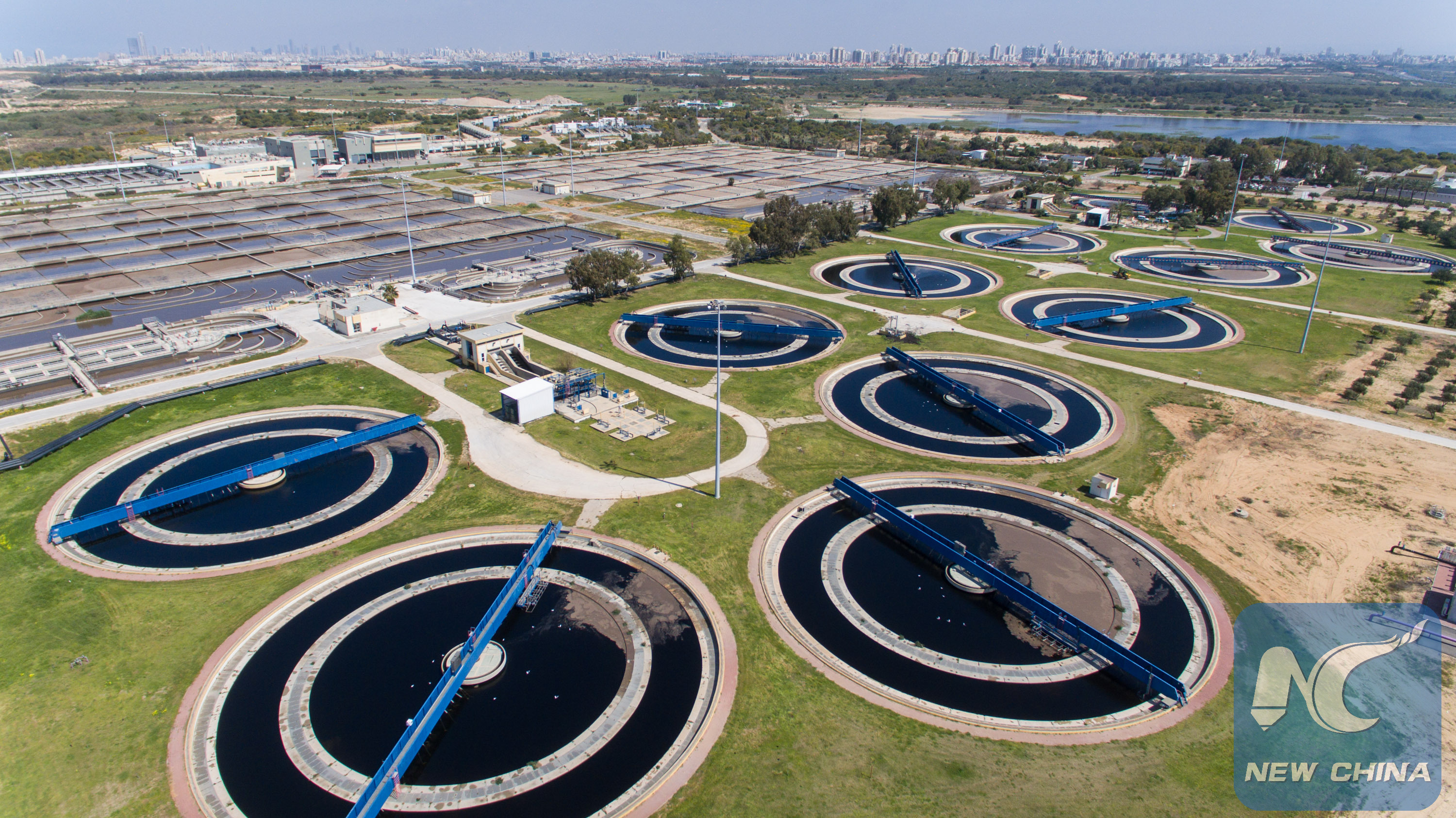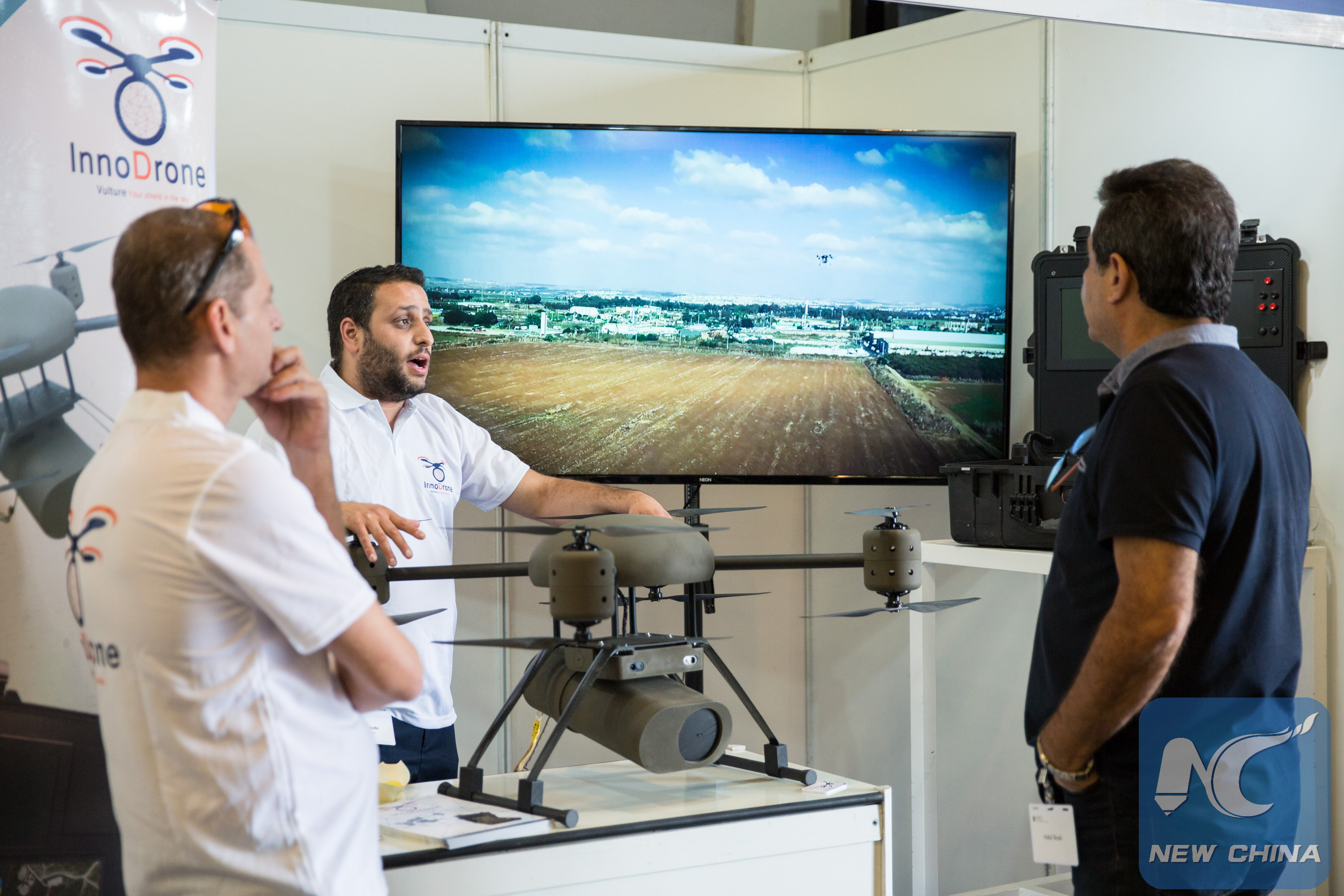By Guo Bensheng, Editor-in-Chief of Xinhuanet
From 12 to 14 May, during my stay in Israel with the delegation of Xinhua News Agency, I visited six institutions and enterprises. "Innovation" is a key word throughout the whole visit. We were trying to decode the secrets behind the success stories in innovation of Israel, known as the "country of innovation."
When Innovation Becomes "Ecology"

Photo taken on March 18, 2019 shows a sewage treatment plant in Tel Aviv, Israel. (Xinhua/ Guoyu)
The Jerusalem Venture Partners (JVP) is the first stop we visited. Walking into its headquarters, I saw several young men and women standing on the grass chatting. They were brainstorming for an innovative project.
"Innovation has changed Israel" and "Innovation has changed our society" is the first thing JVP founder and chairman, Erel Margalit, said when meeting us.
This is by no means exaggeration. Data shows that high-tech industries provide about one-third of Israel's employment and contribute more than half of the country's GDP. Among the high-tech companies listed on Nasdaq, the total number of Israeli companies ranks the second, only after the United States.
Innovation won't be possible without investment. In the process of innovation, venture capital funds play an important role. JVP, for example, is one of the world's top venture capital agencies, with about 1.2 billion U.S. dollars in funds investing in more than 120 innovative companies in countries and regions such as Israel, the United States and Europe.
But JVP is not just about identifying the promising innovation projects. According to Margalit, JVP currently is focusing on innovation technology in seven areas: industry 4.0, internet security, digital health, food safety, new media, film and television production,and ocean and desert research, aiming to cultivate large enterprises that can lead the whole industry. What they value is the ecosystem for innovation.
Indeed, Israel has unique innovative power, not only in terms of individual talents, but also a good innovative ecosystem. In this innovation ecosystem, entrepreneurs, talents, colleges and universities, government agencies, financial institutions and so on have established close ties to support innovation.
As for the innovative ecology, it has also been confirmed in our visits to the Israel Innovation Authority, Tel Aviv University, Haaretz and the Ministry of Regional Cooperation.
According to a survey, Israel's innovation ecological chain generally contains six elements, namely, start-ups, engineers, research-oriented universities, venture capital, government and large enterprises, which interact with each other and facilitate the process from invention to innovation.
It is not difficult to see that the success of JVP is due to Israel's good innovative ecosystem. And, at the same time, it is also an important part of the ecological chain. This is why it seems that innovation in Israel never shows signs of slacking up.
In Israel, with a population of about 8 million, there is no huge domestic market, so start-ups have to face the world from the outset. Margalit said that whenever science and technology innovation plans are put forward, they must be an international plan and must cooperate with China, the United States, Europe or other countries. JVP plays an important role in making this kind of cooperation happen.
A Smart "Visible Hand"

People visit the International Autonomous Unmanned Systems and Robotics Conference and Exhibition at LAGO conference center in Rishon Lezion, Israel, on Oct. 15, 2018. (Xinhua/Guo Yu)
When it comes to innovation, the role of government must be mentioned. And it is often compared to that of a "visible hand".
In Israel's innovation ecosystem, the Innovation Authority is regarded as the most important "hand of government". When we met Aharon Aharon, CEO of the Israel Innovation Authority, he had just concluded an important meeting. Aharon joked that he was always too busy to breathe.
With a fund of 500 million U.S. dollars a year, the authority offers special loans to start-ups in the field of science and technology. The interest rate of loans is almost zero. Generally speaking, 30 percent to 50 percent of the R&D funds of start-ups can be borrowed from the authority. On some occassions, it could be up to 85 percent. In Israel, even start-ups working at home can apply for the financial support.
If the project succeeds, the government will take back the loan; if it fails, the loan will not need to be repaid, thus encouraging people to venture.
Asked how much the government can benefit from the financial supporting system, Aharon said that the government doesn't care so much about how much money it earns from the loans. In the form of loans, a dollar invested by the government can often create an output value of 5 to 8 dollars for the Israeli economy.
But the government is by no means in charge of everything. Start-ups must also look to the capital market and accept the test of "market hands". "They have to know how to raise money from the private sector. If they can't raise it, it means their projects are not good. That's not going to get our loan support." Aharon said.
Generally, the government does not participate in the decision-making of specific projects. In the Innovation Authority, there are more than 200 experts who assess each innovation project's in four aspects, namely, technology description, global market potential, market and technology team, and the impact of Israeli economy. Every year, there are more than 4,000 applications, of which about 1,500 are approved. The success rate of incubation of early start-up companies is from 6 percent to 12 percent, while that of small and medium-sized enterprises is higher.
Aharon said the mission of the Innovation Authority is to strengthen Israel's innovation ecosystem by providing service to early start-ups, growth companies, multinational corporations, and innovative manufacturers.
In this support system for innovation, the government and private funds "share risks, but not necessarily benefits", which means that, if the project is successful, government funds can gradually exit and turn to new firms.
When the government role is in place, the market will naturally not be absent. Statistics show that in 2018, Israeli civilian high-tech R&D expenditures accounted for 4.3 percent of GDP. The number of Israeli start-ups is among the highest in the world, and more than 350 multinational companies have R&D centers in Israel.
Great Potential for China- Israel Innovation Cooperation

A Sichuan Airlines plane lands at Ben Gurion international airport near Tel Aviv, Israel, on Sept. 26, 2018. (Xinhua/Guo Yu)
Israel is an innovation power and China is a big country striving to be more innovative. Cooperation between China and Israel in this aspect of course is on the agenda of our visit. In March 2017, China and Israel established the "Innovative Comprehensive Partnership". It is worth noting that the partnership is preceded by "innovation", making clear what the focus of cooperation between the two countries is on.
During the visit, we felt that China-Israel innovative cooperation is gaining momentum. The investment of Chinese companies in Israel totals about 7 billion US dollars, most of which is in the field of science and technology. In JVP, our conversation was opened by Alibaba's investment. In the Innovation Authority, when asked about cooperation with China, Aharon excitedly told us that the Authority has signed agreements with many provinces and cities in China.
Tzachi Hanegbi, Israel's Minister of Regional Cooperation, has visited China for seven times. In his view, China-Israel relations are on the rise and economic and trade relations are close, especially in the field of scientific and technological innovation.
In the Israeli innovation system, universities are an important part. The head of Tel Aviv University told us that a high proportion of the university's academic achievements has been commercialized. As the source of a large number of Israeli start-ups, the university has signed academic cooperation agreements with more than 30 universities in China, including Tsinghua University, Peking University and Fudan University.
Israeli people told me that there have been many delegations from China in recent years, ranging from national ministries and commissions to local authorities, as well as enterprises and universities. Most of the delegations came with the same goal, that is, learning from innovative experiences and seeking innovative cooperation.
At present, China is moving towards an innovative country. It is ready to absorb and draw on all the innovations of the world in an open manner, and contribute to creating a better life for human beings.
What we need to learn from Israel should not be just those on the surface, but we must thoroughly understand Israel's innovative spirit, innovation culture and innovation ecology, and also focus more on their innovation mechanism.
Of course, Israel has its characteristics, and China has its own national conditions. But the idea of innovation should be common. We deeply understand that the spirit of innovation is the most precious for any country, industry or individual, because only innovation can bring about vitality. Enditem

